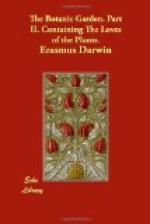This violent effect of the poison at so great a distance from the tree, certainly appears surprising, and almost incredible; and especially when we consider that it is possible for delinquents who approach the tree to return alive. My wonder, however, in a great measure, ceased, after I had made the following observations:
I have said before, that malefactors are instructed to go to the tree with the wind, and to return against the wind. When the wind continues to blow from the same quarter while the delinquent travels thirty, or six and thirty miles, if he be of a good constitution, he certainly survives. But what proves the most destructive is, that there is no dependence on the wind in that part of the world for any length of time.—There are no regular land-winds; and the sea-wind is not perceived there at all, the situation of the tree being at too great a distance, and surrounded by high mountains and uncultivated forests. Besides, the wind there never blows a fresh regular gale, but is commonly merely a current of light, soft breezes, which pass through the different openings of the adjoining mountains. It is also frequently difficult to determine from what part of the globe the wind really comes, as it is divided by various obstructions in its passage, which easily change the direction of the wind, and often totally destroy its effects.
I, therefore, impute the distant effects of the poison, in a great measure, to the constant gentle winds in those parts, which have not power enough to disperse the poisonous particles. If high winds are more frequent and durable there, they would certainly weaken very much, and even destroy the obnoxious effluvia of the poison; but without them, the air remains infested and pregnant with these poisonous vapours.
I am the more convinced of this, as the worthy ecclesiastick assured me, that a dead calm is always attended with the greatest danger, as there is a continual perspiration issuing from the tree, which is seen to rise and spread in the air, like the putrid steam of a marshy cavern.




